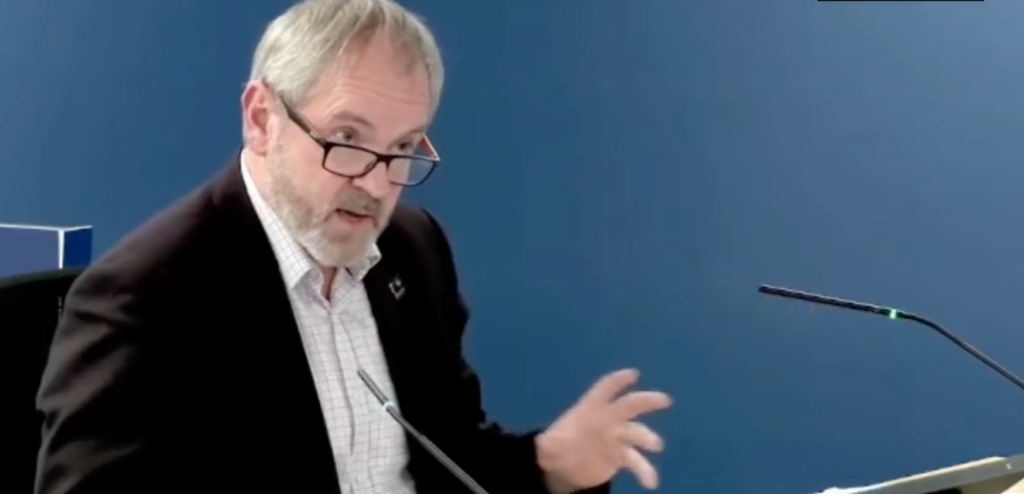UK Covid inquiry turns its focus to Great Barrington Declaration
Lockdown sceptics are being exposed to a very different line of questioning.


This week the UK Covid inquiry briefly turned its attention to one of the most visible and consequential departures from the mainstream lockdown position in 2020: the Great Barrington Declaration.
But in doing so, the inquiry revealed an alarming lack of professionalism among senior scientists towards dissenting viewpoints and a reluctance to seriously consider these perspectives in its own assessment of the evidence.
The central premise of the GBD was that Covid policies were causing significant social harms and that a different approach, called “Focused Protection”, was required to balance viral control with population health and social wellbeing until we reached herd immunity.
Now we have learnt that the current UK Chief Scientific Adviser, Dame Angela McLean, called prominent lockdown critic Carl Heneghan, whose views were in line with the GBD, a “fuckwit” on a WhatsApp chat during a September 2020 Government meeting. Opposing lockdown was also considered “half-baked nonsense” by fellow Sage member John Edmunds, from the London School of Hygiene and Tropical Medicine.
Heneghan, director of the Centre for Evidence-Based Medicine at the University of Oxford, was among 32 senior UK academics who published an open letter against lockdown as the Government was debating the autumn 2020 lockdown. According to the Guardian, writing at the time, this revealed that there was “a schism within the scientific community over how to tackle the second wave of coronavirus in the UK”.
But this week, in the questioning of Heneghan’s support of the Great Barrington Declaration (he did not, in fact, sign it), the inquiry revealed an alarming lack of appreciation for what the document intended to achieve.
The first, contrary to the inquiry’s assumption, was that the GBD did not make “clear how well the vulnerable segment could be protected from infection in practice”. Yet the Declaration itself never sought to be prescriptive: “a comprehensive and detailed list of measures, including approaches to multi-generational households, can be implemented, and is well within the scope and capability of public health professionals,” it wrote.
The inquiry also sought to advance the idea that the GBD was “flawed” because it advocated for younger people to “live their lives as normal”, which has been negatively presented in large sections of the media as a “let it rip strategy”. Heneghan argued that this did not mean people would not take any precautions, and pointed to the importance of voluntary behaviour change and the experience of Sweden. This was also confirmed by Prof. Mark Woolhouse, who noted that “with the legal requirement to stay at home, I haven’t seen any good analysis that says actually that was the killer punch that was really needed.”
Earlier this week, Neil Ferguson from Imperial College again reiterated that his widely-shared mathematical model, used to justify lockdown in 2020, did not account for voluntary behaviour change or the indirect consequences of restrictions on society. Heneghan also challenged the inquiry’s simplistic framing (and misunderstanding) of herd immunity, a central concept in the GBD, and the risks of long Covid.
In general, it would appear that the position of Heneghan and other scientists who supported the Great Barrington Declaration is now subject to different standards of questioning and evidence in the inquiry. Yet, these dissenting viewpoints are critical to understanding whether the Government’s actions were necessary and proportionate.
In response to being called a “Fuckwit” by the current UK Chief Scientific Adviser, Heneghan’s response illuminated one of the central problems with the scientific community during the pandemic:
It is not unusual to find yourself in a position of disagreement. We call it uncertainty […] The very fact that you have opposing views shows you that there is a problem within the interpretation and the understanding of the evidence, but it also shows me a position of: that sort of language would mean I would become resistant to any other’s viewpoint or discussion.
– CARL HENEGHAN
Indeed, it has now become clear that Sage and its subgroups relied too much on a faulty consensus and ignored minority scientific views. Understanding the events of the Covid years demands that we engage in complex questions about risk, trade-offs, viral-host dynamics and human behaviour. The history of science and medicine often shows us that, with time, those brave enough to offer dissenting voices can often end up being in the right.
The lack of professionalism among the mainstream scientific community, together with a worrying sidelining of reasoned opposition, veers into the world of dogma.
Follow Kevin Bardosh on X (formerly Twitter) @KevinBardosh
